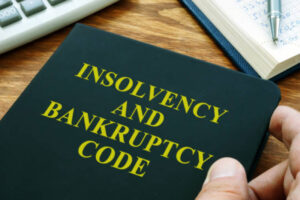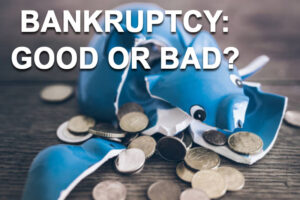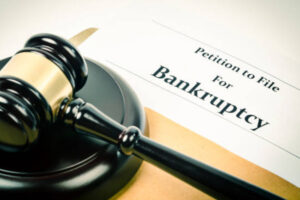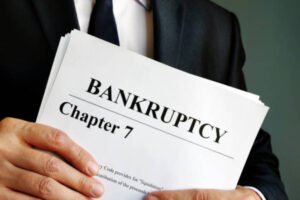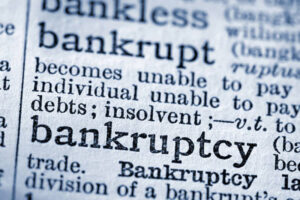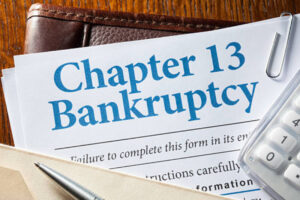Drowning in credit card debt? Bankruptcy might just be the lifeline you need—or a cannonball tied to your feet.
Let’s slice through the jargon, debunk myths, and spotlight what bankruptcy really means for your wallet.
By the way, what is bankruptcy?
In plain speak, bankruptcy is the court saying you’re so broke, the idea of you paying off your debts is comedy gold.
But here’s the kicker—it can actually wipe your debt slate clean.
This isn’t monopoly money. We’re talking real-life “debt be gone” magic.
But what’s the catch? Because, yes, there’s always a catch.
Is Filing for Bankruptcy as Bad as They Say?
Credit scores take a hit, sure. Imagine your score is a soaring eagle. Bankruptcy is the hunter.
It’s not pretty.
But ask yourself: is a stellar credit score worth the endless debt spiral?
Sometimes, cutting losses means losing a bit of ego (and points) to save your sanity.
Who Should Consider It?
If your debt is yelling louder than fans at a rock concert, it’s time to consider bankruptcy.
It’s not for the “I forgot to pay my credit card last month” crowd. It’s more like, “I need a financial rebirth” kind of scenario.
Are bill collectors your new BFFs? Do you dread the mailman’s daily delivery of doom? Yep, might be time.
Types of Bankruptcy. The Menu Options
There are flavors to bankruptcy, mainly Chapter 7 and Chapter 13 in the U.S. Debt buffet, anyone?
- Chapter 7. The Clean Slate. It’s like a financial detox. You might lose some assets, but it’s a quick purge of unsecured debts.
- Chapter 13. The Payment Plan. This one’s for earners who can handle a remix of their debt. You pay back a portion through a court-approved plan.
But, Will It Solve My Problems?
Short answer. Maybe.
Long answer. It’s a fresh start, but not a cure-all.
It won’t fix bad spending habits. If your wallet is an open wound, bankruptcy is just the first stitch in a much-needed financial mend.
It won’t fix bad spending habits. If your wallet is an open wound, bankruptcy is just the first stitch in a much-needed financial mend.
What About Your Credit?
Here’s the inside scooper.
Bankruptcy can stick to your credit report like that one relative who won’t leave your house for up to 10 years.
Not great for future borrowing plans. Need a loan during that time?
Good luck, you’ll need it.
Should You Be Embarrassed?
Heck no! Pride doesn’t pay the bills.
Financial woes are like quicksand. The more you hide and struggle, the deeper you sink.
Shouting “I need help!” is smarter than silent sinking.
Life After Bankruptcy. The Recovery
Recovery is tough but think of it as rehab for your wallet.
Post-bankruptcy life involves rebuilding credit, which is slow. Like, grandma-driving slow.
But every payment made on time is a step toward financial health. It’s about habits, patience, and a bit of frugal living.
How Do I Start Over?
Step one. Breathe.
Got that? Good.
Now, get financially literate.
Budgeting isn’t just for nerds. Understand where every dime of your money goes.
And maybe cut back on those triple-shot lattes? Just saying.
Bankruptcy is no fairy godmother. It won’t turn your Honda into a Porsche or your beer into champagne.
It’s a tool, not a miracle worker. Use it wisely, and it can be the first step to a debt-free existence. Misuse it, and you’ll be back to square one.
It’s a tool, not a miracle worker. Use it wisely, and it can be the first step to a debt-free existence. Misuse it, and you’ll be back to square one.
Final Thought. It’s A Tough Call
Bankruptcy should be your last resort, like, “the ship is sinking, and I don’t know how to swim” last resort.
But if the debt is suffocating, and you need to breathe again, it could be your ticket to a new start.
Just make sure you’ve tried everything else first. Budget cuts, debt management plans, maybe even selling stuff you don’t need.
If you feel lost in the bankruptcy sea, contact a bankruptcy professional to help you navigate the rough seas if you choose to embark on this journey.
Disclaimer: The information provided in this article is for educational and informational purposes only and should not be construed as financial, legal, or professional advice. While efforts are made to ensure accuracy, the content may not reflect the most current legal or financial developments. No representations or warranties are made about the completeness, reliability, or accuracy of this information. Results may vary. Using any information provided is solely at your own risk. Consult with a financial advisor or attorney for specific advice tailored to your situation.

